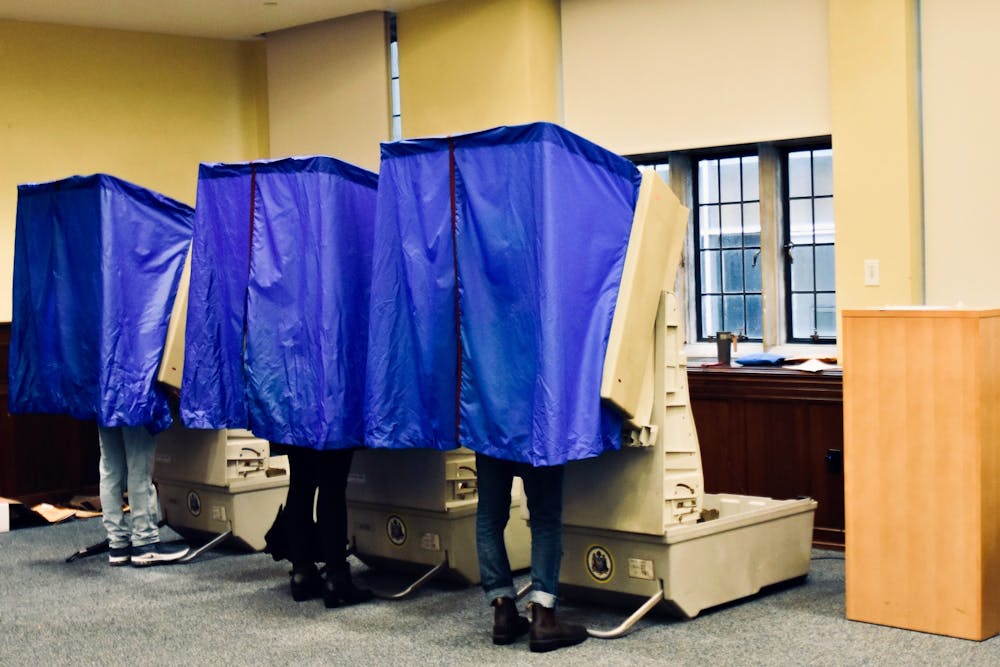Backlogs and delays in receiving mail-in ballots may prevent some from casting their votes in the June 2 primary, despite a one-week extension of the deadline to receive mail-in ballots.
Pennsylvania delayed its primary from April 28 to June 2 in an effort to slow the spread of the coronavirus pandemic, and encouraged voters to vote by mail. Pennsylvania Governor Tom Wolf issued an executive order Monday night extending the deadline for elections offices to receive mail-in ballots by one week. Although absentee voters can now mail their ballots until June 2, some Penn students who applied for a mail-in ballot from out of state may still be unable to vote because of delays in receiving their ballots.
In order for their vote to count, students' ballots must be postmarked by June 2 and received by the elections office by 5 p.m. EDT on June 9. Although voters with Pennsylvania I.D. could apply for a mail-in ballot online, student voters from out of state were required to print, fill out, and mail a ballot request form to the elections office by 5 p.m. EDT on May 26 in order to receive their ballot in the mail.
Wolf's executive order extended the deadline for elections offices to receive the ballots from June 2 to June 9 in six counties. The order applies to Philadelphia County, as well as Allegheny, Dauphin, Delaware, Erie, and Montgomery Counties. The order came amid the coronavirus pandemic, and after three days of protests and civil unrest in Philadelphia.
The surge in mail-in ballot requests has overwhelmed elections offices, resulting in a delay in mailing out ballots to voters. Over 1.8 million Pennsylvania voters have applied for a mail-in ballot since the start of the pandemic.
Voters may not receive their ballots for more than a week after sending an application, and many will likely not receive their ballots until after the June 2 deadline to mail in ballots has passed.
Rising College junior and Penn Leads the Vote co-director Harrison Feinman is currently at home in California, but registered to vote in Pennsylvania. Feinman said he applied for a mail-in ballot in mid-March, received it in mid-May, and sent it to the Philadelphia elections office shortly after.
Although Feinman received his ballot early enough to mail it ahead of the June 2 deadline, he said he is concerned that backlogs in elections offices will prevent many students from casting their votes.
RELATED:
The Pa. mail-in ballot application deadline is May 26. Here’s what you need to know.
Gov. Wolf extends deadline for mail-in primary ballots to June 9
“I’m 100% sure, and so are the experts, that there are going to be ballots that aren’t counted because [they] just [don't] arrive in time,” Feinman said.
Rising Wharton junior and PLTV deputy director and field organizer Rania Zakaria said she requested a mail-in ballot application online in mid-May, because she does not have a printer at home and could not print and mail the application. She said she received the application only a few days before it was due at the election office. As of May 30, she had not received her ballot in the mail.
Zakaria said she feels frustrated that she may not be able to vote in the Pennsylvania primary, even with the extension, due to circumstances out of her control.
“It’s definitely discouraging to now have tried to vote absentee and have failed, not because I did anything wrong or missed any deadline, but just because I wasn’t sent my ballot in time,” Zakaria said.
Warnings of a possible second wave of coronavirus in the fall have prompted concerns about mail-in voting on a large scale in November elections. President’s Distinguished Professor of Political Science Michael Jones-Correa said elections officials can learn from the primaries in order to better prepare for voting by mail in the general election.
Jones-Correa said elections officials will need to inform voters early of their deadlines to request a mail-in ballot, and must send ballots to voters early enough that they can mail them in on time. He added that he hopes elections officials will accommodate voters who do not have Internet access, and therefore cannot request a mail-in ballot online.
“Counties are going to learn a lot, hopefully, with this primary experiment,” Jones-Correa said. “This is in some ways a dry run for what happens in November, and I think we will all need to act early in order to have access to the ballot."
Zakaria said despite the difficulties of voting by mail in this election, she hopes Penn students will not be discouraged from voting in future elections. She cited a study from Tufts University, which found that Pennsylvania youth voters had the second greatest impact in the 2016 election among youth voters in all 50 states.
“Even though it can be discouraging, that doesn’t make your voice any less important or any less deserving of being heard," she said.









